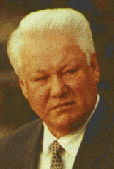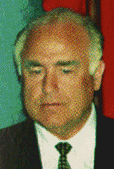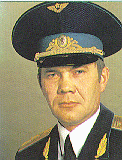Russia: Yeltsin's Victory
The votes are in, and Russia's incumbent president Boris Yeltsin has won a second four-year term. The final official tabulations will not be available until July 9, but preliminary returns give Mr. Yeltsin 53 to 54 percent of the vote and his Communist opponent, Gennady Zyuganov, 40 to 41 percent. Approximately 67 percent of the eligible voters participated.
Yeltsin's hard-fought victory in the July 3 run-off election caps a remarkable campaign. Last December his party, which goes by the sentimental name Our Home is Russia, captured only slightly more than 10 per cent of the vote in elections to the Duma, or parliament. Yeltsin's personal ratings, according to popularity polls, ran even lower for a short time during the winter.
Much of the world breathed a sigh of relief when the early returns became known. Among other things, Yeltsin's re-election means:
- A continuation of the democratic processes that have been evolving in fits and starts ever since 1986, when former Soviet Communist Party chief and USSR president Mikhail Gorbachev promulgated the sweeping policy changes known as glasnost' (openness) and perestroika (restructuring).
- Russians anxious for stability can relax, at least for the moment, knowing that there is continuity in their governing structures.
- Western governments can maintain their generally good relations with Russia, reassured that the Communists have not returned to power.
- Foreign investors, especially West European firms, are encouraged to develop their activities in this potentially giant market.
Under the Surface
No one can feel entirely comfortable with the results, however. In the first place, it must be remembered that Mr. Zyuganov, President Yeltsin's opponent, received about 40 percent of the votes. Zyuganov ran ahead of Yeltsin in many electoral districts, particularly in the Volga region.
Nor does Yeltsin's win dispel the serious questions about his health. The president's first public appearances after July 3 showed a hale and hearty picture, but illness had forced Yeltsin to disappear from the spotlight -- and from most official duties -- for almost a week prior to the election. Spokesmen for Yeltsin insisted he suffered only from a cold and sore throat, but rumors, attributed by some to inside sources, said he had in fact suffered an attack of angina pectoris. Yeltsin's recent bouts with heart disease continue to fuel speculation about his health and the possibility of renewed governmental instability should he die or became unable to carry out his duties.
Who Stands in the Wings?
According to Russia's current political laws, Prime Minister Viktor Chernomyrdin stands next in line to succeed Yeltsin, but only as an interim president. Should President Yeltsin die, new presidential elections would take place, leading to another campaign and probably another inconclusive first vote followed by a run-off election. Few Russians are eager to see this happen soon.
Mr. Chernomyrdin, leader and founder of Our Home is Russia, leads a less-than-stable coalition of parties in the Duma.
Also standing in the winds, however, is the mercurial Aleksandr Lebed, a 45-year-old former army general who is seen as a moderate-to-rightwing Russian nationalist. The surprise third-place candidate in the first round of elections, Lebed subsequently allied himself with President Yeltsin and now serves as the head of Russia's Security Council.
There is speculation that the popular Lebed, buoyed by Yeltsin's recent embrace, might challenge Chernomyrdin's right to succeed Yeltsin should the occasion arise.
The Real Winner
In an important sense, the real winner of the election is the Russian citizenry. Ten years ago, no one in the world would have predicted a totally democratic presidential election in Russia, devoid of violence and for the most part contested with a minimum of foul play. Allowing for flaws that are not unknown in Western democracies -- mud-slinging campaign pitches, charges of excessive spending on the part of Yeltsin -- the process flowed smoothly. And at least in the early days following the election, it appears that Russians of all political stripes are ready to accept the results.
That in itself is a victory for humanity.
Stay Tuned
For detailed election news direct from Moscow, visit the site of Russia's National News Service, in English or Russian (if you have the proper software). For a load of background information on the Russian election, connect to Russian Presidential Elections - 96, a Magellan 3-star Web site.
For ongoing news about Russia, connect to the Maximov searchable news index. And for analysis, try Radio Free Europe/Radio Liberty.
Posted July, 1996.
© Copyright 1996 OBS




